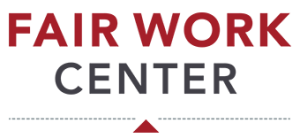Fair Work News – April 2019
APRIL 2019
Pay day for Jorge
Jorge was something of a jack of all trades at the popular restaurant in Shoreline where he’s worked for years. He worked a number of roles in the kitchen and helped out as a server in the dining room when needed. Jorge was not paid properly. His employer would pay him irregularly and only when asked. And he was never paid all that he was owed – it was always just enough to survive, enough to pay rent or buy groceries when needed. To make matters worse, the temporary owner kept incomplete and inaccurate records of his hours, so Jorge wasn’t getting any paystubs to document his hours or the full degree of wage theft he was experiencing.
Working with the Fair Work Center Legal Clinic, Jorge recreated over a year’s worth of his work calendar and calculated that he was owed more than $22,000. We worked with him to develop a demand letter that we sent to his employer. After Jorge received no response, we helped him file a wage theft claim with the Washington Department of Labor & Industries (L&I). Throughout the investigation, we supported Jorge in navigating the process with L&I and responding to their inquiries and requests for additional information. L&I recently sided with Jorge and sent their own letter to the temporary employer demanding he pay Jorge the $22,000 he’s owed.
Shady scheduling and discrimination on display at the mall
Belle, who works at a jewelry store at a mall in Seattle, first contacted Fair Work Center after experiencing frequent disruptions in her work schedule. In addition, she felt that her employer’s treatment towards her was drastically different than their treatment towards other employees. For example, while other employees were allowed to take breaks freely, Belle was required to get permission in advance. Belle never received any disciplinary actions from her employer and did not understand why she was subjected to this different treatment.
During Belle’s consultation, we discovered that Belle is the only elderly worker in that store; all other employees are in their 20s and 30s, including Belle’s supervisor.
As a salesperson part of her pay is through commission, but the nature of sales in the store are such that people often come in once, scope out what they want and come back later to make the purchase. Because Belle’s schedule was so unpredictable, she would not be able to let customers know when she might be in the store next. This meant that often another salesperson would get commission on the sale that she did the bulk of the work on.
We provided Belle information about our state laws regarding breaks and commission. We advised her that Seattle’s Secure Scheduling Ordinance requires large retail and food service employers with more than 500 employees globally to, among other things, post schedules two weeks in advance, or provide additional compensation to workers for last-minute changes to the schedule. If her employer meets its criteria, it would be in violation. In addition, we advised her to begin documenting her treatment at work in order for us to better assess her whether employer had violated age discrimination rules.
If we determine her employer is covered by Secure Scheduling, we will be able to take action that will not only fix Belle’s scheduling concerns but her coworkers’ too. We are also continuing to work with Belle to address concerns around age discrimination in a way that enables her to keep her job and, just as importantly, close more sales and receive more commissions.
When a hiring bonus isn’t a bonus for getting hired
Dudley worked as service technician for a small general contractor company. He mainly went to other small businesses to make repairs or perform other building services. The primary reason he took this job over others he was considering was because the company was offering a $1,500 hiring bonus for qualified candidates. In his interview, he asked about the hiring bonus and says he was told he would get it upon starting to work.
Unfortunately, he ended up being terminated two months into the job but never received his hiring bonus. He came to Fair Work Center looking for help getting bonus he was promised in his interview. We’re supporting Dudley in preparing to file a claim in small claims court where a judge will decide if an employer can be held accountable to a verbal agreement made in an interview.
Because the law around how hiring bonuses work is a little murky, there are likely many other workers in the situation of feeling like they are owed an advertised hiring bonus only to never receive it upon taking the job. We know it is common for employers to promise one thing to their workers and do another, so we will be fighting hard to help Dudley get his bonus.
Three strikes don’t make this dismissal right
Juanita worked at a nonprofit organization in Seattle from 2008 until very recently. Until early last year, she never had any sort of disciplinary or performance issues with management and was considered an integral part of the team. In fact, Juanita was someone a lot of people in the office came to for questions or support when they needed help.
Last year, her longtime supervisor was terminated and replaced by a new, younger supervisor. Juanita is older than most of her coworkers, and she noticed that her employer was moving towards hiring younger workers. She started to feel like she was being pushed out by her new supervisor, both in how she was being treated day to day and also in the trivial things she was being disciplined for by her supervisor. The first time she was written up it was because she spent six minutes in the copy room when her supervisor said it should only take two minutes. The second time she received a notice saying she was taking excessive bathroom breaks. She became suspicious of her supervisor’s actions and even noticed a few of her newer coworkers following her around the office and timing her breaks. Juanita believes her supervisor directed those coworkers to pay close attention to her activities. It was at that point she first came to Fair Work Center for legal consultation.
The final straw that led to her termination came one day when the office was closing and a client showed up in a state of emergency seeking services. Because she was committed to providing services to people in need, she stayed an extra hour to counsel the client. Company policy is that workers must get advance approval for overtime hours, so, after two trivial strikes already against her, she was written up again for her third strike for taking an unapproved overtime hour and terminated. She feels it was retaliation by her supervisor, who was just waiting to find a reason to let her go.
Juanita first tried going through the internal HR complaint processes twice, but HR sided with management both times. So when she was officially terminated she said she was going back to Fair Work Center to seek legal counsel. At that point, her employer offered her a severance package. We supported Juanita in preparing for the severance negotiation with HR and management, which resulted in her getting the payout she was looking for.
A balancing act: standing up for herself & keeping her job
Gabriela is a Mexican immigrant who works at a Mexican restaurant. She contacted Fair Work Center after a cook, who she did not get along with, put an extremely hot pepper in her salad without her knowing. She raised this issue with her supervisor but no action was taken; the cook was not warned, disciplined, or otherwise put on notice of his behavior. So she took it up to a higher level of management and asked for their help. Gabriela was then written up by her immediate supervisor for going over his head to management, even though her immediate supervisor ignored her complaints.
Gabriela had been working at that restaurant for more than 10 years. And in that time, Gabriela’s schedule remained relatively consistent. Yet as soon as she started to raise concerns over her coworker’s aggression towards her, her schedule changed drastically. Not only were her work hours reduced, but she was scheduled to work “clopening” shifts, where she was required to close one day and open the next. She feared she would soon lose her job entirely.
She was referred to Fair Work Center by one of our community partners, and we provided Gabriela about her workplace rights and advised Gabriela about retaliation. We also discussed ways for her to effectively address her concerns with her employer. Gabriela left the clinic feeling empowered to talk to her employer to address the retaliation and to request that her schedule return to what it previously was. After speaking with her employer, she got her old schedule back. In addition, the problematic cook was transferred to work at another location. Gabriela felt relieved to no longer be working with that cook but still had concerns about her personal safety, given the cook’s strong dislike of her. We provided her with information and resources on how to file for a protection order.
Putting tips back on top
Working WA, our sibling organization, has been organizing gig workers (i.e., people who work for app-based companies like Postmates, Instacart, and Doordash) for the past couple of years. Last fall, Mia, a worker on the grocery delivery app Instacart and leader on Working WA’s gig economy campaign, raised the alarm about major pay cuts on Instacart. She and her coworkers were getting paid 30-40% less for each job, the company was using a black-box algorithm to set pay. And what’s more, they were taking customers’ tips instead of passing them on to workers.
When a customer tips, it is generally understood as extra money for the service provided by the worker. But Instacart was just paying the worker less and pocketing the tip. Here’s how it worked. An Instacart shopper might agreed to take a job that promised $10. The customer who made the order agreed to a $5 tip for the work. But instead of that worker getting $15, Instacart used the tip to subsidize the amount they paid the worker for the job.
Working WA started a petition demanding better pay, no more tip theft, and a more transparent pay system for Instacart’s workers. In a few short weeks it was signed by more than 3,500 gig workers and customers outraged by Instacart’s shady pay practices. Workers and customers were standing up and speaking out, and the media took notice. Bloomberg News did a piece on the petition, which generated even greater attention to the petition and generated even more news stories and social media outrage among gig workers and customers alike.
The tremendous weight of public outrage in combination with the power of gig worker’s organizing forced Instacart to put tips back on top of pay. But the change Instacart made wasn’t enough – they’re still paying workers too little and their pay stubs are still a mystery. And these problems aren’t limited to Instacart workers. Gig workers on all apps are facing low pay and lack of transparency. So they are continuing to organize and a national campaign called #PayUp to demand $15 plus expenses for each hour they work, tips on top, and pay transparency.























